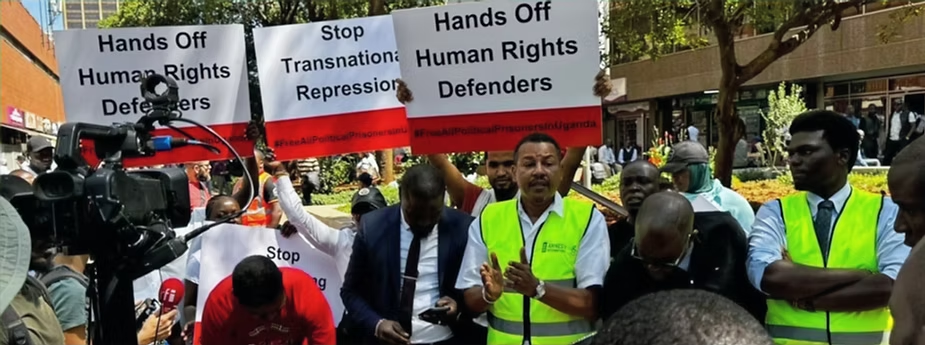Convened to demand the release of Dr. Kizza Besigye and all Ugandans unlawfully detained for holding a political conscience, Monday’s protests in Nairobi were extraordinary. Rather than faced with the menu of gas, assault, and arrest, the National Police Service facilitated protesters to peacefully petition National Assembly and the High Commission of Uganda. Are we seeing a change in protest policing?
Since the 2021 Uganda General Elections, the right to free expression, association and assembly continues to deteriorate at an alarming rate. Despite credible reports documenting extrajudicial killings, forced disappearances, arbitrary arrests, detention and torture of political opponents, restrictions on civil society organisations and the media, government reluctance to prosecute security service officers has led to widespread impunity.
With Ugandan elections coming up in January 2026, tensions are sharpening. Kenyans and the international community were shocked to see these tensions play out on Kenyan soil over 2024. Thirty-six Forum for Democratic Change members and then, their leader Dr. Kizza Besigye and Obeid Lutale, were unlawful kidnapped in Kisumu in July and Nairobi in November respectively before being forcefully deported and detained in Uganda. To date, the Kenyan government has criticized neither incident.
With Dr. Kizza Besigye’s health worsening last week, the patience of twelve Kenyan, Tanzanian and Ugandan civic organisations, national associations of doctors and lawyers and fifteen citizens snapped. On Monday 24 February, the signatories presented two separate petitions to both houses of parliament and the Uganda High Commission to Kenya.
The first petition calls on Senate and National Assembly committees responsible for human rights and foreign relations to impartially investigate the recent cases of abductions and renditions as crimes under international law, summon our security services and call for the prosecution of all involved.
The second petition condemns the militarization of Ugandan judiciary, calls for the immediate release and protection of Dr. Kizza Besigye, Hajj Obeid Lutale and their advocate Eron Kiiza, review of all cases of civilians being tried in military courts and investigation into Defence Forces Chief and President Museveni’s son Muhoozi Kainerugaba’s death threats against Kizza Besigye. While Kenyans wait to see responses to these two petitions, important lessons can be drawn from Monday’s public protest.
After directly observing no less than twenty protests over 2024, public protests had become orgies of violence. Triggered by police refusal to accept notices or pre-emptive arrests of organizers, police and protesters have seemed at cross-purposes and mutually suspicious rather than collectively guided by Article 37.
Too few officers display emotional awareness, active listening and conflict management skills while policing protests. When confronted by large numbers of angry but peaceful protesters, the possibility of violence is escalated rather than defused. The violent are not isolated and contained. The authority of the protest leaders and marshals is not reinforced but undermined. Even emergency workers, media journalists and bystanders became targets and victims. Senior command and the Interior Ministry has been disinterested in reaching out to “serial protesters” or learning new ways of keep all safe while some exercise their right to express themselves.
The behaviour of Kenyan police this week sharply contrasted from a long season of violent protest policing and must be commended. Following notification on Friday, commanders established early contact with the protest organisers and escorted the protest marchers to both locations three days later. Rather than a day of cat and mouse games, indiscriminate teargassing, assaults and crowded police holding cells, petitions were peacefully read within 90 minutes of the march without a single violent incident.
Kudos to Senator Dan Mwanzo and MP Yusuf Hassan who addressed and then escorted protesters to register their petitions. Regrettably, the Uganda High Commission hid behind the Vienna Convention and closed for the day rather than receive the two-page letter.
Perhaps Monday’s operation could be written up as a case study for Kiganjo police training college. Perhaps also, the Uganda Police Service and the Uganda Peoples’ Defense Forces could benchmark how the universal right to free expression and assembly can be facilitated for their own citizens.
Irũngũ Houghton is Amnesty International Kenya Executive Director and writes in his personal capacity. Email: [email protected]


